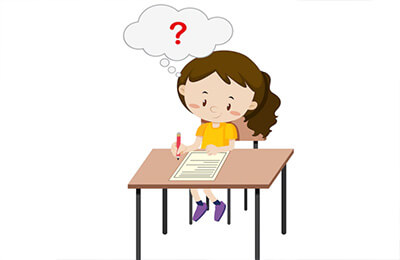如何应对反义疑问句
时间:2022-10-03 11:02:28

反义疑问句(The Disjunctive Question)又叫附加疑问句,它表示提问人的看法,没有把握,需要对方证实。反义疑问句由两部分组成,前一部分是一个陈述句,后一部分是一个简短的疑问句,两部分的人称时态应保持一致。如何确定附加疑问句,同学们可从以下几个方面考虑。
一、一些特殊句
Iwishtohaveawordwithyou,mayI?
Openthewindow,willyou?
1.以let’s开头表示建议的祈使句,反义问句用shallwe;以letus或letme开头的祈使句,反义问句用willyou。如:
Let’sgotoseeafilm,shallwe?
Letmeknowwhenyouwillgohome,willyou?
Let us go on to the next item on the agenda,will you?
2.如果陈述部分是“used to +实意动词”,反义问句有两种形式。如:
The Smiths used to live in Shanghai,didn’t they / usedn’tthey?
Youusedtogetupearly,usedn’tyou/didn’tyou?
3.含dare或need的句子。如:
Hedarestogothere,doesn’the?
Hedarenotdoit,darehe?
Ineedn’ttellyoutheresult,needI?
Youneedtobuyabetterdictionary,don’tyou?
二、疑问句中代词的确定
1.陈述句中的不定代词为nothing,everything,something,anything时,反义问句的代词用it来代。陈述句中的不定代词为everyone,everybody,anyone,anybody,noone时,反义问句的代词用they/she/ he来代。如:
Someoneiscoming,isn’the?
Everyonepassedtheexam,didn’tthey?
2.noneof后跟不可数名词时,反义问句的代词用it来代;后跟可数名词或代词noneofyou/them/us时,反义问句的代词用you/they/we来代。
3.陈述句中的不定代词为this /that时,反义问句的代词用it来代。
4.陈述句中的不定代词为these/those时,反义问句的代词用they来代。
5.陈述句为there be句型时,反义问句的代词用there来代。
There used to be a tailor’s shop near here,didn’t there?
6.陈述句为定语从句、名词性从句或含动词不定式或动名词短语时,反义问句的代词用it来代。如:
Playingbasketballisaninterestingsport,isn’tit?
7.陈述句中的代词为eachofthem/you/us时,反义问句的代词用they/you/we。
三、含有宾语从句的句子
由说话人强调哪部分来决定,即看说话人的着眼点在哪部分。如:
He doesn’t think she will come tomorrow,doesn’t he/willshe?
但是当主句主语为第一人称时,由I suppose/I think/Iimagine/Ibelieve(动词为意向动词)引导的宾语从句,一般只起缓和语气的作用,只针对从句,要注意否定转移。如:
Idon’tthinkheishonest,ishe?
有时根据上下文意思,也可否定不转移。如:
Idon’tbelievesheknowsit,doesn’tshe?
主句主语是第二人称时,根据上下文的意思判断。如:
YousaiditwasIwhostolethewatch,didn’tyou?
注意:在复合句中,反义问句的主语及助动词要与主句一致。
四、含有情态动词must的句子
1.must的一般用法。如:
Hemustgetupearly,mustn’the/needn’the?
2.must表示推测,对现在、过去和将来的推测,但要注意与它否定形式的区别。如:
Hemustbeathome,isn’the?
YoumustknowRose,don’tyou?
Hemusthaveseenthefilm,hasn’the?
五、如何确定主句为肯定或否定
1.含有not的句子视为否定句。
2.谓语动词或形容词有前缀、后缀表示否定意义的句子视为肯定句。如:
Idislikehim,don’tI?
3.nothing或none作主语的句子视为否定句。如:
Nothingcouldmakemestop,couldit?
4.陈述部分出现否定意义的副词或代词(如hardly/never/seldom/little/few...)的句子视为否定句。
5.含有noneof的句子视为否定句。如:
Noneofthefoodtastedgood,didit?
6.当陈述部分为并列句时,根据靠近后面的句子确定;当陈述部分为主从复合句时,随主句的主语和谓语动词变化。如:
Heisanartistbuthiswifeisateacher,isn’tshe?
This is the first time that she has been to abroad,isn’tit?
7.反义疑问句的回答用yes或no,但是,当陈述部分是否定形式时,回答要按事实。如:
―Theydon’tworkhard,dothey?(他们工作不太努力,是吗?)
―Yes,theydo.(不,他们努力工作。)
(―No,theydon’t.对,他们工作不努力。)
―Alice,youfeedthebirdtoday,________?
―ButIfedityesterday.
A.doyouB.willyou
C.didn’tyouD.don’tyou
分析:不少同学会误选D,认为这是一个普通的反义疑问句,但根据下文的语境butIfedityesterday(但我昨天才喂过鸟),表明上文是在要求对方喂鸟。另外,前一句的称呼语Alice也是一个重要的信息,联系此信息和下文语境,可断定youfeedthebird today是一个带主语的祈使句,应选择B。
―Idon’tlikehim,________?
―No,Idon’tatall.
A.doIB.doyouC.don’tID.doeshe
分析:同学们容易误选A,认为这是一个普通的反义疑问句,陈述句主语为I,疑问部分也要用I,但关键是联系下文的语境(No,I don’t at all),表明前一句是在询问对方的看法,所以用doyou,选择B。这里的doyou相当于doyoulikehim。
(责任编校彭益)